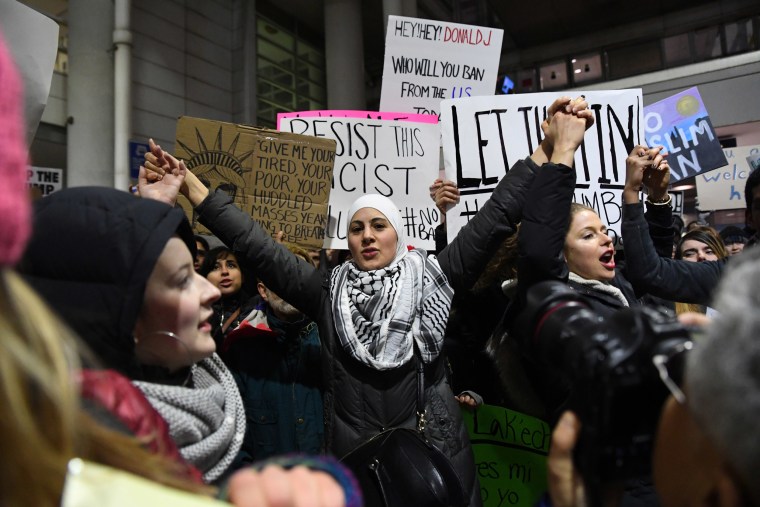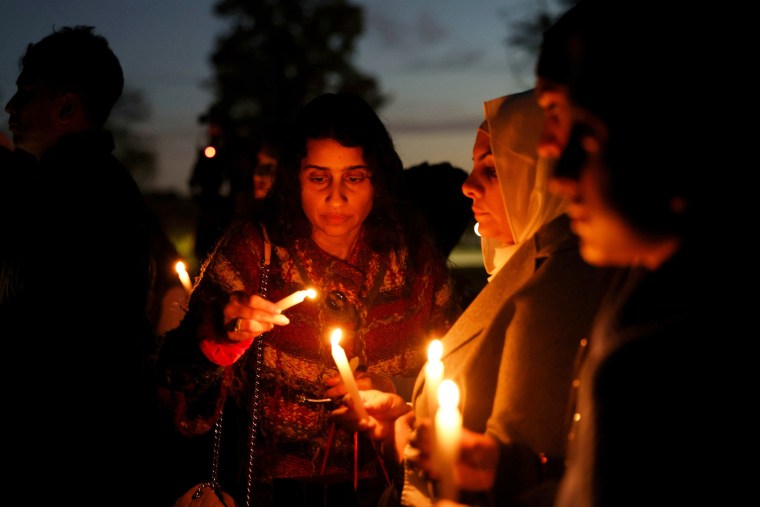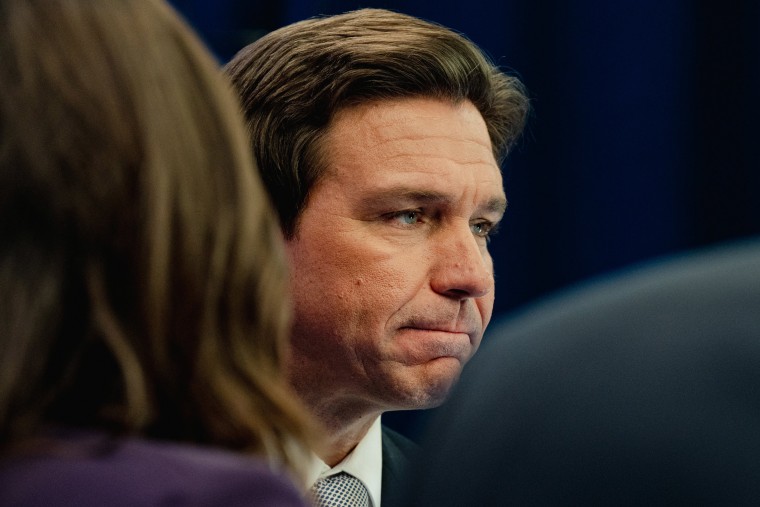In 2017, President Donald Trump triggered national outrage for implementing a so-called Muslim travel ban, blocking U.S. admissions for travelers from predominantly Muslim countries. The move prompted widespread protests and legal challenges, and Joe Biden rescinded it in one of his first actions as president.
But even before Trump suggested such a ban, a low-profile congressman named Ron DeSantis quietly introduced what amounted to an early version of that travel order.
On Dec. 1, 2015, DeSantis — now the governor of Florida and a Republican presidential candidate — introduced the Terrorist Refugee Infiltration Prevention Act, which would have blocked entry of refugees from certain countries “if the alien is a national of, has habitually resided in, or is claiming refugee status due to events in any country containing terrorist-controlled territory.”
The countries outlined in the bill, which never got out of committee, were Iraq, Libya, Somalia, Syria and Yemen. It was introduced not long after President Barack Obama agreed to resettle 10,000 Syrians amid a humanitarian crisis in that country. That rankled a number of Republicans, who said the policy brought too many risks.
“You do not bring refugees into the country if there’s a chance that they will be terrorists who will attack the American people,” DeSantis said at the time.
That history is prescient today as DeSantis seeks the GOP presidential nomination amid turmoil in the Middle East. He has already said he would not accept refugees from Gaza into the U.S., and Muslim groups warn that he is no different from Trump when it comes to his policies toward majority-Muslim countries. Those policies, they say, damage relations at home and further fuel the potential for threats and violence already targeted at the community.
“People are worried; they’re concerned,” said Wa’el Alzayat, the CEO of Emgage, a Muslim civic engagement and advocacy group. “People like Trump and DeSantis and MAGA Republicans continue to inflame the situation.”
Trump, the far-and-away front-runner in the Republican presidential race, has said he will seek to reimpose his travel ban — which Biden overturned after the Supreme Court upheld it — and would expand it to include refugees from Gaza.

DeSantis’ campaign would not say whether DeSantis would seek to reimpose Trump’s travel ban or a version of it should he be elected. But a spokesman did say DeSantis stood by his previously introduced bill.
“Trump didn’t build the wall, and held off on the deportation of illegal immigrants to appease the Democrats,” DeSantis spokesman Bryan Griffin wrote in a message. “The only serious option that voters have in 2024 for someone who will build the wall, end the illegal immigration crisis, and make U.S. immigration policy work foremost to the benefit of America is Ron DeSantis. The critics’ fake narratives will not deter him.”
Trump spokesman Steven Cheung responded by taking aim at DeSantis’ job in Florida.
“He also has an illegal immigrant problem of his own,” Cheung said, referring to a Newsweek article about undocumented immigrants in Florida. “The state he’s supposed to be governing is one of two who has seen increases in illegals in the last few years. He needs to get his ass back home and do his job.”
DeSantis is already under fire with the Muslim community after he used the phrase “so-called Islamophobia” on the debate stage on Nov. 8, seeming to raise doubt over whether Islamophobia was a real issue.
“What is Biden doing? Not only is he not helping the Jewish students who are being persecuted; he is launching an initiative to combat so-called Islamophobia. No, it’s the antisemitism that’s spiraling out of control. That is what we have to confront,” DeSantis said at the debate, which was sponsored by NBC News.
The words were deeply offensive to members of the Muslim community, who are grappling with hate incidents since the Israel-Hamas war began, Alzayat said. He said the phrasing and talk of Muslim bans only intensify an already fraught issue, potentially putting Muslims in harm’s way.
“I think DeSantis is an Islamophobe and perfectly comfortable with Muslims’ being killed,” Alzayat said. “He is what he is saying.”
Alzayat pointed to the recent shooting of three Palestinian American students in Vermont, which is still being investigated as to whether it was a hate crime, and the stabbing death of a 6-year-old Palestinian American boy in Illinois as having unnerved the Muslim community.

DeSantis’ campaign said he stood by his comments.
Alzayat has also been critical of Biden’s handling of the Israel-Hamas war and the devastation in the Gaza Strip. But he said those concerns are far different from issues with the Republican Party.
“He [Biden] has been a disappointment. But we should not confuse that with equating him or his presidency with Donald Trump or any of these other people,” Alzayat said. “I want to make that distinction very clear.”
Samir Kakli, the president of the executive committee of the South Florida Muslim Federation, also took issue with DeSantis’ “so-called Islamophobia” remark.
“Imagine if he said ‘so-called antisemitism,’ how furious would the outrage be?” Kakli wrote in a statement. “This is part of an unfortunate double-standard in elected officials across the country, especially in Florida, that fuel hatred against the American Muslim community, contributing to a 216% surge in Islamophobic attacks and incidents nationwide.”
Kakli noted that DeSantis has called for banning pro-Palestinian groups on Florida college campuses, saying he is “trying to silence voices that he doesn’t agree with.”
“Palestinian students wearing kefiyyahs were just brutally shot in Vermont 2 days back, 1 of them is not expected to ever walk again,” Kakli said. “Minimizing Islamophobia puts Americans at risk. Our elected officials have a duty to keep every American safe.”
DeSantis’ comment also drew a rebuke from the White House and from the Biden campaign, which told NBC News: “Ron DeSantis’ xenophobic, hateful rhetoric contributes to the type of violence and hate crimes we’ve seen over recent weeks,” campaign spokesman Ammar Moussa said. “It’s racist, extreme, and deeply un-American — and as President Biden has said, has no place in our nation.”

